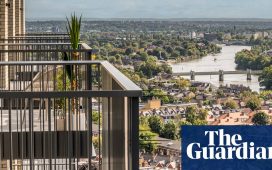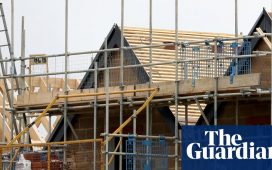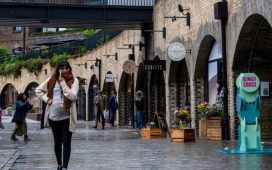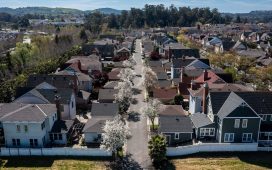Malaysia’s billionaire king is trying to resuscitate a huge real estate project he helped launch in his homeland, with its Chinese developer Country Garden having succumbed to the property crisis in mainland China.
With plans for luxury condominium towers, hotels, a shopping mall and golf course, the $100bn Forest City development straddling artificial islands on Malaysia’s southern coast was billed as a “dream paradise” when the project was launched in 2014. It aimed to provide homes for as many as 700,000 people across 7,000 acres by 2035.
More than a decade later, the joint venture between China and Malaysia appeared to be more of a ghost city on a recent visit by the Financial Times, with largely empty apartments and quiet streets. In a stark example of the far-reaching effects of China’s economic downturn, the project’s debt-laden developer Country Garden has been unable to prioritise its largest overseas project. It is alleged that only 15 per cent of Forest City has been built in terms of land area.
However, Country Garden’s troubles have provided an opening for Malaysia to address the situation. Sultan Ibrahim Iskandar, who became king in January under the country’s five-year rotating monarchical system, has taken a more active role in the project’s direction in recent months, according to two people familiar with the development, although the shareholding structure has not changed.
Company records show Country Garden still owns 60 per cent of the project, while a private company, Esplanade Danga 88, of which the king owns 64 per cent, has the remaining 40 per cent. This puts the king’s overall stake at roughly 25 per cent.

Advisers to the business-friendly, motorcycle-riding monarch — who is also the ruler of the state of Johor, where the project is based — have engaged the federal and state governments this year on suggestions for repositioning Forest City.
Daing A Malek Bin Daing A Rahaman, a Malaysian businessman and member of the royal court of advisers to the king, is one of the people taking advice on the project’s direction, the two people said. Malek owns shares in Esplanade Danga 88 and is a director in Country Garden Pacificview, the master developer, filings show.
Country Garden Pacificview reported a loss after tax of RM342mn ($72mn) in 2022, but has not reported 2023 figures.
“Country Garden has bigger problems to deal with and has let the Malaysia side take charge, even though [the Chinese group] is still the biggest shareholder,” one of the two people said, adding that Malaysia had become frustrated with the “empty” development.
The national palace did not respond to a request for comment.
In the months following Country Garden’s debt default last October, Malaysia has sought to make the project more of a commercial district, with Forest City included in a proposed special economic zone between Johor and neighbouring Singapore. The king has given his strong public backing for the initiative set to be signed by the state and federal governments this year.
Plans have also been raised to move some government agency offices to the site by the end of the year, according to one official. Prime Minister Anwar Ibrahim last year announced that Forest City would be designated a special financial zone, with incentives including lower income tax rates.
The existing commercial and leisure parts of Forest City have generally also fared better. The golf course on a weekend in June was fully booked, and the adjoining hotel had a 70 per cent occupancy rate, thanks mostly to golfing enthusiasts from Singapore and South Korea and a Singaporean church group, according to staff on duty.
Forest City’s exact status in terms of sales is difficult to verify. Country Garden and the Malaysian state government, when cited in media reports, have made claims varying from the project being only 15 per cent built to 70 per cent of the units built thus far having been sold in the past two years.
An onsite showroom in Forest City displaying a model of the project has multiple “sold out” signs over replica apartment blocks. However, the air-conditioning was off and only two salespeople were on duty on a visit to the largely empty hall by the FT in June. The streets and a duty-free shopping mall were mostly devoid of people. The residents’ club room with an infinity pool in the landmark Carnelian Tower condominium was locked, with no lights on.
Country Garden was once seen as a stable player in China’s property market after peers such as Evergrande defaulted in 2021 and sparked a cash crunch. But the developer, which had $200bn in liabilities as of the end of 2022, defaulted on its offshore debt payments last October and this year has faced a winding-up petition in Hong Kong, currently adjourned until the end of July, as it attempts to restructure.
The main criticism levelled at Forest City by the Malaysian side is that Country Garden marketed the project squarely at Chinese buyers wanting a second home or an investment, rather than at residents of Malaysia or Singapore. But bad timing, with pandemic lockdowns and President Xi Jinping’s stricter controls on moving capital and travelling overseas, left swaths of the 28,000 built units empty. Many are available today for resale at lower prices or for rent on local real estate websites.

Country Garden’s Forest City project disputed in a statement that it was a “ghost town” and said there had been no recent change in the projects’ management rights. There was no specific deadline for the 700,000 total population target, it added, and of 10,000 current residents, more than half commute to Singapore.
One former Country Garden employee, who visited the Malaysian project in its early stages in 2016, said the “kick-off of the project was quite difficult”.
The person added that the company offered the promise of lucrative bonuses for salespeople but also required the prospective project managers to buy properties themselves in order to support initial sales volumes. He estimated there were hundreds of project managers for sales involved in Forest City.
“I know some people, they joined, put their stake there, got fast-tracked, became senior project managers,” he said. “Now it’s just stuck, I know many people regret it already.”
Additional reporting by A. Anantha Lakshmi in Jakarta










